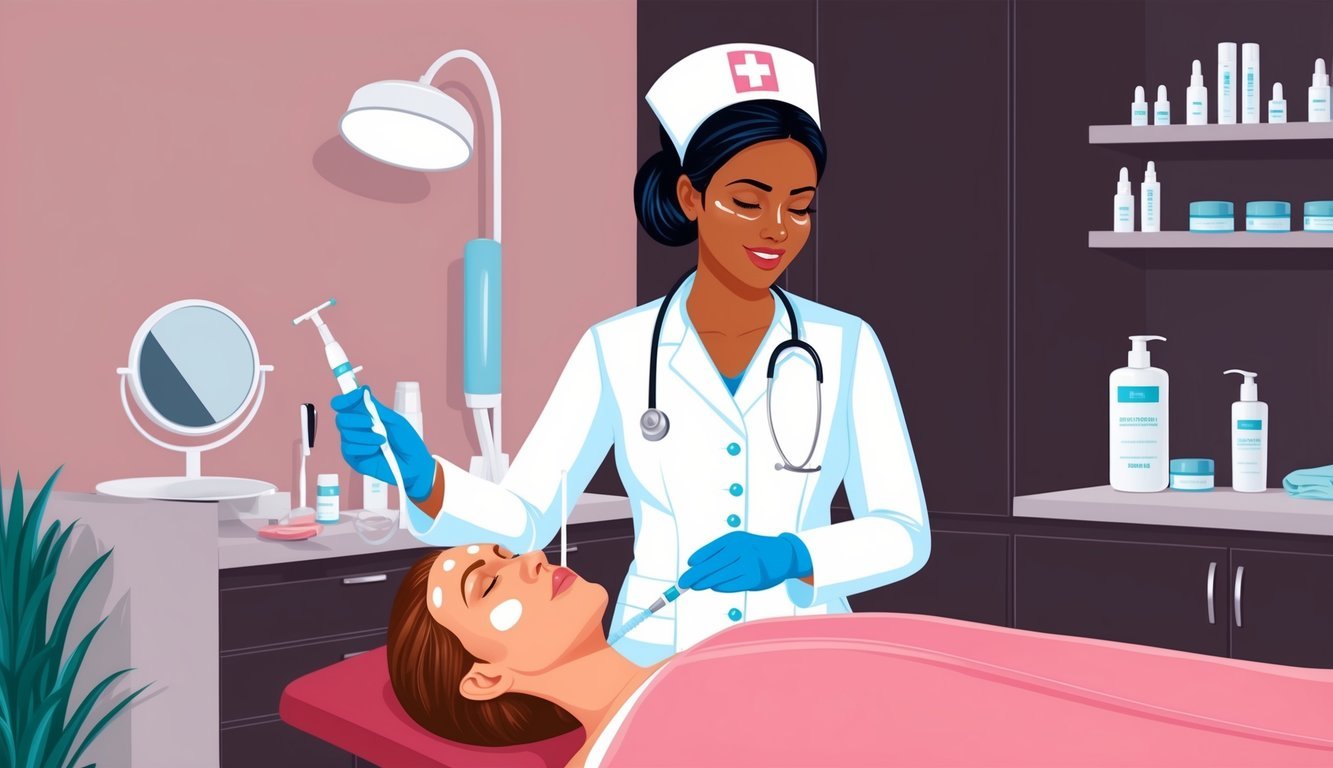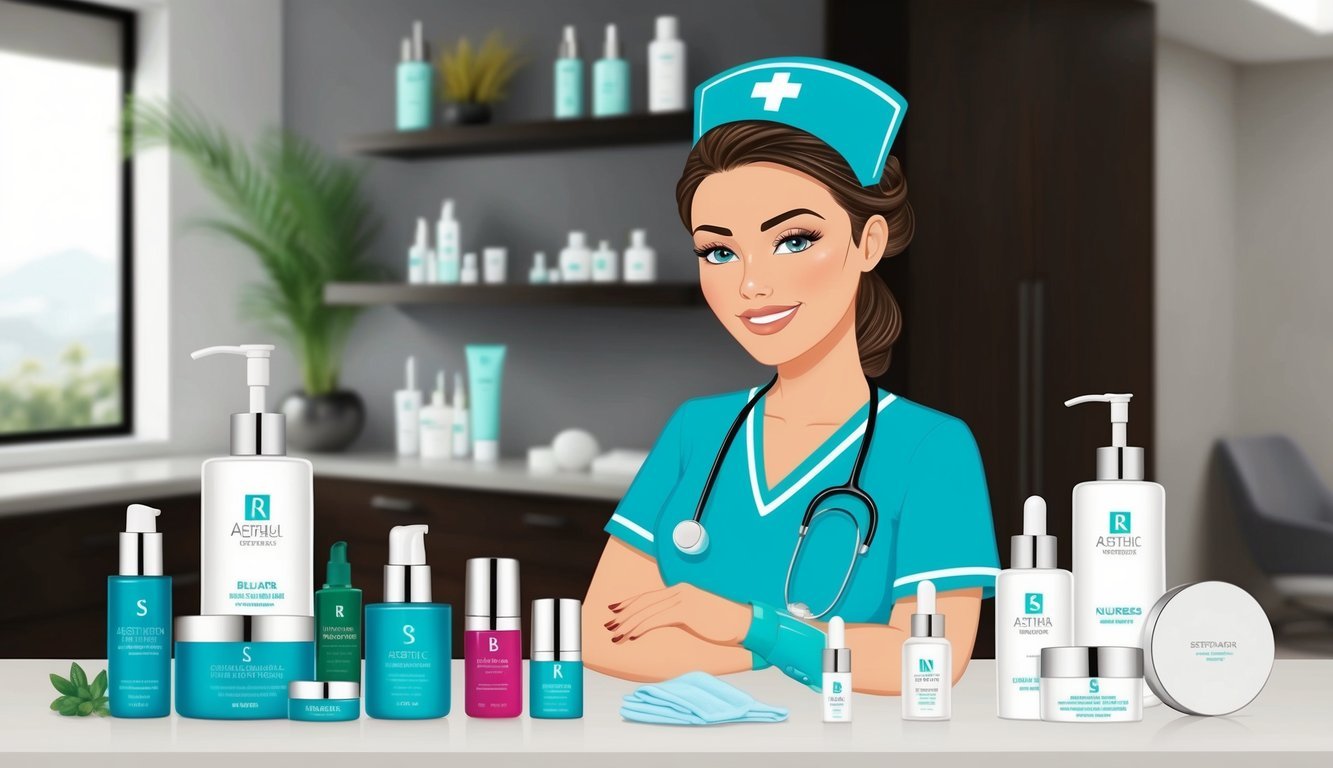As the aesthetic industry grows, many nursing professionals are curious about the financial rewards of this specialization. An aesthetic nurse earns about $80,321 per year, on average.
Some positions offer salaries as high as $136,000, depending on experience and location. This field combines nursing skills with beauty treatments, making it appealing to those interested in both health and aesthetics.
A career as an aesthetic nurse allows you to work in various settings, from medical offices to spas, providing essential cosmetic procedures.
The mix of education, certifications, and hands-on experience influences not only your earning potential but also your job satisfaction.
Understanding these factors can help you navigate your career trajectory in this dynamic field.
Key Takeaways
- The average salary for an aesthetic nurse is around $80,321 per year.
- Education and certifications significantly affect earning potential and job opportunities.
- Aesthetic nurses work in diverse environments, enhancing their career flexibility.
Understanding Aesthetic Nursing

Aesthetic nursing focuses on cosmetic procedures and enhances patient care through specialized training.
This field combines nursing skills with an artistic approach to improve patients’ confidence and appearance.
Scope of Practice
As an aesthetic nurse, your scope of practice includes performing cosmetic procedures such as injecting fillers, administering Botox, and laser treatments.
You must be knowledgeable about skin care and effective ways to rejuvenate the skin.
It’s essential to stay updated on the latest techniques and products in the aesthetic field.
Each state has its own regulations governing what procedures nurses can perform, so understanding local laws is crucial for safe practice.
Aesthetic Nursing vs. Traditional Nursing
Aesthetic nursing differs significantly from traditional nursing.
While both roles require compassion and patient care, aesthetic nurses focus on cosmetic enhancements rather than treating medical conditions.
In traditional nursing, your responsibilities may involve managing illnesses or providing treatments to promote health.
Aesthetic nursing emphasizes beauty and individual client needs, requiring a different set of skills and knowledge in cosmetic products and techniques.
Roles and Responsibilities
Your roles as an aesthetic nurse include conducting consultations with patients, assessing their needs, and developing personalized treatment plans.
You also administer treatments, manage patient care during and after procedures, and educate clients on skin care and maintenance.
You play a key role in ensuring patient safety and comfort during cosmetic procedures.
Strong communication skills are vital in building trust and explaining options to patients.
Being detail-oriented will help you succeed in this specialized nursing field.
Staying informed about the latest trends and techniques will enhance your expertise and improve patient outcomes.
Educational Pathways and Certifications
To become an aesthetic nurse, you need to follow specific educational paths and obtain relevant certifications.
These steps ensure you are well-prepared for the demands of this field.
Nursing Degrees and NCLEX-RN
Your journey begins with earning a nursing degree.
You can choose between an Associate Degree in Nursing (ADN) or a Bachelor of Science in Nursing (BSN).
An ADN typically takes 2-3 years and can be obtained through community colleges.
A BSN usually requires 4 years at a university and provides broader training.
After you complete your degree, you must pass the NCLEX-RN exam to become a registered nurse (RN).
This licensure is essential as it allows you to practice nursing legally.
Passing the NCLEX-RN demonstrates your competency in nursing knowledge and skills.
Once you are licensed, you can focus on specializing in aesthetics.
Specialized Aesthetic Nurse Training
Once you’re an RN, you can pursue specialized training in aesthetic nursing.
This training includes practical experience in cosmetic procedures such as injections and skin treatments.
Programs often cover topics like facial anatomy, skin assessment, and product knowledge.
You may find programs offered by various universities and clinics that focus specifically on aesthetics.
Additional training can include workshops and mentorships with experienced professionals.
Many aesthetic nurses also join associations such as the American Association of Aesthetic Medicine and Surgery for networking and further education.
Certification for Aesthetic Nurses
Certification can enhance your career as an aesthetic nurse.
The most recognized credential is the Certified Aesthetic Nurse Specialist (CANS).
This certification shows that you have specialized training and experience in aesthetic nursing.
To obtain CANS, you need to meet specific educational and experience requirements and pass an exam.
Other options include certifications like the Certified Plastic Surgery Nurse and Dermatology Nurse Certified.
These credentials can open more doors and establish your expertise.
Table: Aesthetic Nurse Certifications
| Certification | Certifying Body |
|---|---|
| Certified Aesthetic Nurse Specialist | Plastic Surgical Nursing Certification Board |
| Certified Plastic Surgery Nurse | American Board of Plastic Surgery |
| Dermatology Nurse Certified | Dermatology Nurses’ Association |
Obtaining these certifications can significantly boost your credibility in the field and improve your job opportunities.
The Workplace
Your workplace as an aesthetic nurse can greatly affect your day-to-day experiences and salary.
Different settings offer unique environments and opportunities for growth, impacting your career.
Medical Spas and Private Offices
In medical spas and private offices, you typically work closely with clients seeking cosmetic procedures.
These environments focus on beauty treatments, such as injectable fillers, laser therapy, and skin rejuvenation.
Key aspects include:
- Client Interaction: You often build strong relationships with clients, providing tailored care and follow-ups.
- Flexible Hours: Many medical spas offer flexible scheduling, which is helpful for maintaining work-life balance.
- Commission Structure: Earnings can include commissions based on services you provide, enhancing your overall salary.
Working in such settings can be rewarding, as you have the chance to assist clients in achieving their aesthetic goals.
Outpatient Surgery Centers and Clinics
Outpatient surgery centers and clinics provide a different type of environment.
Here, you may assist in more invasive procedures or surgeries requiring anesthesia.
Important points to note:
- Team Environment: You often work as part of a larger medical team, collaborating with surgeons and other healthcare professionals.
- Technical Skills: Skills in patient assessments and post-operative care are crucial in this setting.
- Higher Salary Potential: Due to the complexity of procedures, salaries may be higher compared to medical spas.
These centers allow you to expand your clinical expertise while serving patients in a specialized role.
Essential Procedures and Treatments

Aesthetic nurses perform a variety of procedures to enhance the appearance and health of their clients’ skin.
Understanding these essential treatments is crucial for anyone entering the field.
Skin Care Treatments
Skin care treatments include services such as chemical peels and microdermabrasion.
Chemical peels involve applying a solution to the skin to exfoliate and improve texture.
They can reduce signs of aging, acne, and discoloration.
Depending on the strength, results can vary from mild improvement to deep exfoliation.
Meanwhile, microdermabrasion uses a device to gently exfoliate the skin, removing dead cells to reveal a brighter layer.
This procedure is often sought for its ability to promote smoother skin and reduce fine lines.
You, as an aesthetic nurse, may also offer tattoo removal, using laser technology to break down ink particles for gradual fading.
Each treatment can require multiple sessions, and it’s important to discuss expected results with patients.
Injectables and Fillers
Injectables like Botox and dermal fillers are popular options for clients looking for immediate results.
Botox involves injecting a neurotoxin to temporarily paralyze muscles, reducing the appearance of wrinkles.
It is typically used on areas like the forehead and around the eyes.
Dermal fillers, on the other hand, add volume to areas such as cheeks and lips.
They can smooth out deeper lines and restore facial contours.
You should ensure clients are aware of potential side effects and what to expect regarding longevity.
In addition, injections can be customized based on each client’s needs, making it essential for you to assess their facial structure and aesthetic goals.
Laser Applications
Laser treatments are advanced procedures that can target various skin concerns, including hair removal and tattoo removal.
Laser hair removal uses concentrated light to damage hair follicles, leading to long-term hair reduction.
This procedure is effective on different skin types, though multiple sessions are generally required.
For tattoo removal, lasers break down the ink particles in the skin.
As with hair removal, it can take several treatments to achieve desired results.
Understanding the specific laser type and technique is vital to ensuring patient safety and satisfaction during these procedures.
Always stay informed about the latest advancements in laser technology to provide the best care.
Aesthetic Nurse Salary Overview

Understanding the salary of an aesthetic nurse involves looking at various factors that influence earnings, differences in pay across states, and how your experience can impact your salary.
Factors Influencing Salary
Several key factors affect the salary of aesthetic nurses.
These include location, experience, education, and workplace type.
-
Location: Aesthetic nurses in states like Alaska and Massachusetts tend to earn higher salaries compared to those in other areas. This is often due to the cost of living and demand for aesthetic services.
-
Experience: Entry-level aesthetic nurses typically start with lower salaries, while those with more years in the field can earn significantly more.
-
Education: Higher certifications or advanced degrees often lead to better pay. Employers look favorably on additional training in aesthetics.
Salary by State and Experience
Salaries for aesthetic nurses vary widely by state and experience level.
Here’s a brief overview:
| State | Average Annual Salary | Average Hourly Wage |
|---|---|---|
| Illinois | $92,590 | $44.51 |
| Indiana | $85,120 | $40.92 |
| Alaska | $86,600 | $41.60 |
| Massachusetts | $88,700 | $42.60 |
As you gain experience, your earning potential increases.
For example, a nurse with 1-3 years of experience may earn around $75,000, while those with 5-10 years can make over $100,000 annually.
Comparing Aesthetic Nurse Salaries
The average aesthetic nurse salary across the U.S. is about $80,321, with many reports indicating similar figures.
ZipRecruiter lists an average of $89,970 for aesthetic nurses, while other sources show salaries hovering around $104,375 depending on specific roles and responsibilities.
It’s important to consider that these averages can vary based on job title and the specific services provided.
The demand for aesthetic treatments, particularly in urban areas, continues to drive salaries higher.
This is a factor to consider if you are evaluating potential job opportunities.
For more detailed salaries based on your region, check resources like NursingProcess.org and Indeed.
Frequently Asked Questions
This section addresses common inquiries regarding the nurse aesthetician profession.
You will find details about qualifications, average salaries, and factors that influence earnings in this field.
What qualifications are required to become a nurse aesthetician?
To become a nurse aesthetician, you need to achieve a nursing degree and obtain a registered nurse (RN) license.
Additional certifications in aesthetics, such as those from accredited programs, can enhance your qualifications.
What is the average salary for a nurse aesthetician in the United States?
The average salary for a nurse aesthetician varies by source.
According to recent data, it can range from around $80,321 to over $104,375 annually.
This variation depends on factors such as location and experience.
For instance, some estimates from ZipRecruiter report average earnings in the low $80,000s.
How does experience affect the salary of a nurse aesthetician?
Experience plays a crucial role in determining your salary as a nurse aesthetician.
Entry-level positions may start at a lower pay rate.
Meanwhile, seasoned professionals can command significantly higher salaries.
Sometimes, their salaries can reach up to $136,000 per year based on their skills and background.
Are there different salary ranges for nurse aestheticians in various states?
Yes, salaries for nurse aestheticians can differ significantly by state.
States with higher costs of living and demand for aesthetic procedures often offer higher salaries.
For a detailed look at state-by-state averages, you can refer to the information found on NursingProcess.org.
What are the common job responsibilities of a nurse aesthetician?
Nurse aestheticians typically perform a range of duties.
These include conducting skin assessments, administering treatments like Botox and fillers, and educating clients about skincare.
They also collaborate with physicians to ensure safe and effective aesthetic procedures.
What factors contribute to the highest paying nurse aesthetician positions?
Several factors influence the highest paying positions in aesthetic nursing.
These factors include advanced certifications, specialized training, years of experience, the type of employer, and geographical location.
Positions in prestigious clinics or urban areas with high demand can lead to better salaries.

